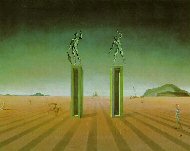Ronald David Laing was a controversial psychiatrist, often associated with the anti-psychiatrist movement. He combined existential philosophy with psychiatry, giving new perspectives on the nature of mental illness.
In his most-known book, The Divided Self, he describes the schizoid person in these terms.
The schizoid individual exists under the black sun, the evil eye, of his own scrutiny…The “self-conscious” person is caught in a dilemma. He may need to be seen and recognized, in order to maintain his sense of realness and identity. Yet, at the same time, the other represents a threat to his identity and reality…He is, therefore, driven compulsively to seek company, but never allows himself to “be himself” in the presence of anyone else…The self is related primarily to objects of his own fantasies. Being much a self-in-fantasy, it becomes eventually volatilized. In its dread of facing the commitment to the objective element, it sought to preserve its identity; but, no longer anchored to fact, to the conditioned and definitive, it comes to be in danger of losing what it was seeking above all to safeguard. Losing the conditioned, it loses its identity; losing reality, it loses its possibility of exercising freedom of choice in the world (Ronald David Laing, The Divided Self, London: Tavistock Publications, 1959).
Laing thought as well that our inner lives and feelings come mainly from our sense of connection with others and from the knowledge that others have about us. Without this, we suffer from an existential insecurity.
In Laing’s words, I can recognize the attitude of another kind of schizoid: the heavy Internet user, who needs to be connected and seen, through social networks and messaging systems, but up to a certain point, at a safe distance. His profile itself and the people he is connected to are mostly objects of his projections. He will introduce himself in order to be seen by others in a likable and acceptable way.
[/en][it]
Ronald David Laing era uno psichiatra controverso. Spesso è stato associata al movimento dell’antipsichiatria e combinava la filosofia esistenziale con la psichiatria, dando nuove prospettive alla natura della malattia mentale.
Nel suo libro più conosciuto, L’io diviso, descrive la persona schizoide in questi termini:
Lo schizoide vive continuamente sotto un sole nero: l’occhio malevole e scrutatore di se stesso. […] La persona “cosciente” di sé si trova in un dilemma. Ha bisogno di essere vista e riconosciuta, per poter conservare il senso della sua identità e della sua realtà; e al tempo stesso gli altri rappresentano un pericolo, proprio per tale realtà e identità. […] Perciò è costretto a cercare compagnia, ma non si lascia mai andare ad essere se stesso in presenza di altri. […] Le relazioni primarie di un io come questo riguardano gli oggetti delle sue stesse fantasie: questa è la ragione per cui alla fine esso si volatizza. Nel suo timore di affrontare con impegno l’elemento oggettivo esso lotta disperatamente per conservare la sua identità, ma non essendo più ancorato ai fatti, alla realtà contingente e definita, corre il rischio di perdere proprio ciò che soprattutto cercava di salvaguardare. Perdendo la dimensione contingente della realtà perde l’identità, e perdendo la realtà perde la possibilità di esercitare un’effettiva libertà di scelta nel mondo. (Ronald David Laing. L’io diviso. Einaudi. Torino. 1969.)
Inoltre Laing riteneva che la nostra vita interiore e le nostre emozioni derivano in grande misura dal senso di connessione che abbiamo con gli altri e dalla conoscenza che gli altri hanno di noi stessi. Senza di queste soffriamo di un’insicurezza esistenziale.
Nelle parole di Laing posso riconoscere l’attitudine di un altro tipo di schizoide: il forte utilizzatore di Internet, che necessita di essere connesso e visto, tramite i social networks ed i sistemi di messaggistica, ma connesso fino ad un certo punto, ad una distanza di sicurezza. I profili che tale utente compila nei siti e le persone con cui si connette sono più che altro produzione delle sue proiezioni. Egli si presenterà in modo tale da essere visto agli occhi altrui nel modo in cui ritiene di essere accettato e allettante.
[/it]
Leggi tutto “Bioenergetic bytes”

